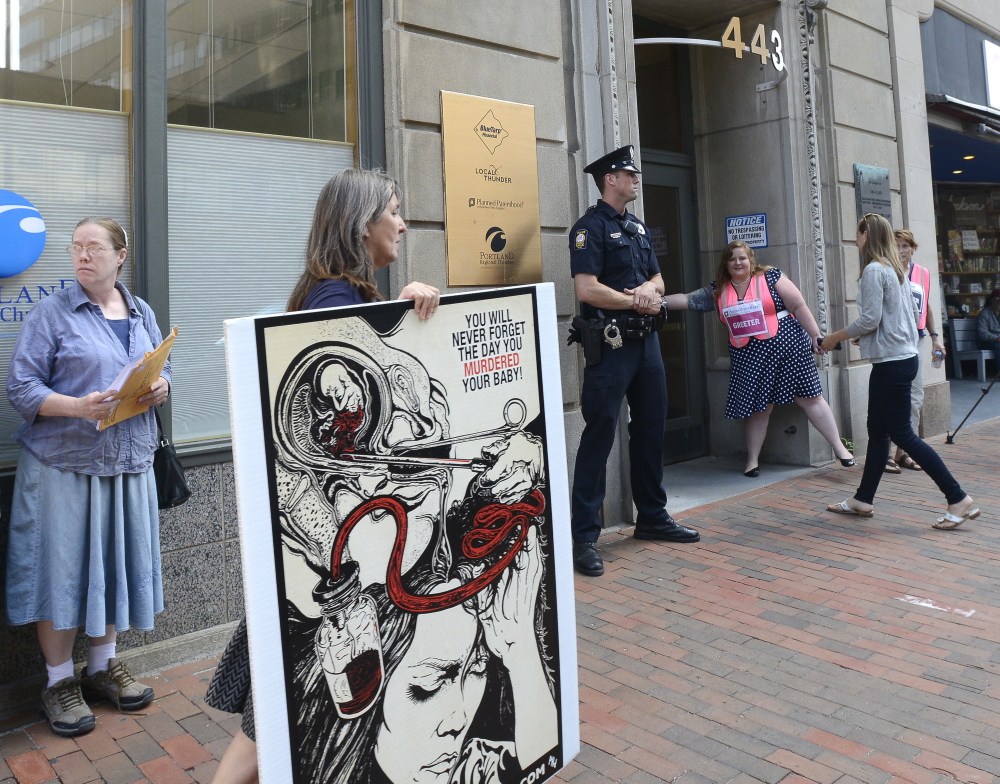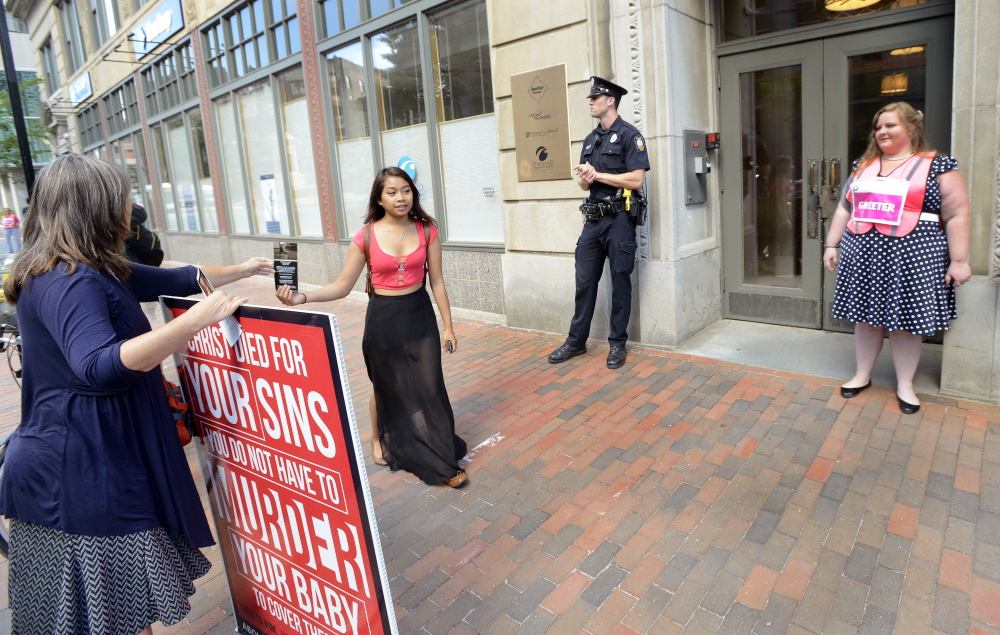A small group of anti-abortion activists protested outside the Planned Parenthood clinic in downtown Portland on Friday morning, the first organized demonstration in front of the clinic since the City Council this week reluctantly repealed a 39-foot protest-free buffer zone.
Most assembled across the street, quietly holding signs condemning abortion. Two women stood just outside the entrance next to a large sign equating abortion to murder, offering religious pamphlets to people entering the clinic or passing by.
It was the first time since November that the protesters were allowed by the city to stand so close to the entrance for women coming to the clinic for abortions or a range of other health services. The U.S. Supreme Court ruled late last month that a similar buffer zone in Massachusetts was unconstitutional, and the City Council repealed Portland’s buffer zone Monday.
The protesters said they cherished the legal victory that allows them to stand where they want to as they try to persuade women not to have abortions. But one member of the group said it made more sense for most protesters to stay across the street and let a smaller number of people try to counsel women entering the clinic.
“It is absolutely important. The Supreme Court said we have a right to stand here and hand out our literature. We’ve broken no laws,” said Donna Hebert, 46, a Waterboro resident who is a member of the Pro-life Missionaries of Maine.
A police officer and several Planned Parenthood volunteers serving as patient escorts outnumbered the protesters next to the clinic entrance. A small group of counterprotesters stood in Monument Square holding signs, including one that said “I support Planned Parenthood.”
There were no disturbances and protesters did not shout or make aggressive moves toward the women entering the clinic Friday.
Planned Parenthood provides family planning, health screenings and other health services at the clinic on Congress Street, in addition to abortion services.
Hebert said the peaceful scene Friday morning is typical of the way the demonstrations have gone in the two years since protesters have stood in front of the clinic, as they are respectful of women who are making a difficult choice. Hebert said three families started the Portland protests, which typically include about a dozen women, men and children.
“We don’t get in people’s faces,” said Hebert, who wore a red T-shirt that said “I speak for those who can’t.”
Hebert said she had four abortions when she was a teenager, but discovered God and now makes it her mission to share her experiences and try to prevent more abortions.
She said that while she has never persuaded any woman entering the Portland clinic to cancel an appointment, she once convinced a woman in Jackson, Mississippi – where Hebert lived more than 20 years ago – that she should forgo an abortion. She said she got to hold the baby after it was born, and the experience keeps her motivated to try to persuade women not to have abortions.
“Saving the life of one child is worth it,” Hebert said.
But Nicole Clegg, director of public affairs for Planned Parenthood of Northern New England, said women coming to the clinic feel harassed and intimidated by the protesters, who at times over the last two years have been more aggressive toward patients. “Don’t draw any conclusions based on what happened (Friday),” Clegg said.
The buffer zone was established in November after complaints by the clinic and patients. The 39-foot setback effectively forced protesters to stand across Congress Street from the entrance. Before Portland’s buffer zone went into effect, anti-abortion protesters would line the sidewalk in front of the Planned Parenthood entrance each Friday morning, carrying signs condemning abortion and speaking directly to some women entering.
On Friday, Planned Parenthood hired a police officer to stand outside the clinic, and doubled the number of volunteer escorts who help patients enter the building.
Clegg said Planned Parenthood will work with the City Council on alternatives to the buffer zone which could ensure that demonstrators do not get too close to patients.
Other cities have crafted alternatives, such as an 8-foot “zone” around patients trying to enter clinics. The Supreme Court did not rule that there couldn’t be any controls on protesters, only that the 35-foot buffer zone in Massachusetts was overly restrictive of free speech rights.
Other municipalities in the United States, including Madison, Wisconsin, and Burlington, Vermont, also repealed their protest-free buffer zones in the wake of the Supreme Court ruling. As in Portland, legal challenges were working their way through lower courts around the country even as the nation’s highest court was weighing the constitutional arguments.
David, an anti-abortion protester who said he did not wish to give his last name because he’s been threatened, said Friday that most protesters chose to stand across Congress Street from the clinic entrance despite the buffer zone’s repeal because a low-key approach by a few women standing next to the entrance would be more effective, with the rest of the protesters giving the women some space.
Leslie Sneddon, an organizer of the protests who declined to be interviewed because of the group’s still-pending lawsuit against the city over the buffer zone, stood outside the entrance. She held a sign that said “You will never forget the day you murdered your baby.”
The city filed a motion this week to dismiss the lawsuit based on the Supreme Court decision and the Portland council’s vote to repeal the buffer zone. While councilors said they hope to find another way to keep protesters from getting too close to the clinic’s patients, city officials have not yet decided what new measures might replace the buffer zone or when they would be enacted.
Pro-choice protesters standing in Monument Square said the tactics of the anti-abortion group have been more strident and harassing when the news media were not present.
Maria, of Portland, who said she did not want to give her last name because her employer would not approve, said she used to be a volunteer escort at Planned Parenthood, and some protesters followed clinic patients right to the door, shouting inflammatory statements at them.
“This is about organized harassment,” said Jackie Sartoris of Brunswick, another counterdemonstrator. “Women are starting to wake up.”
Send questions/comments to the editors.





Comments are no longer available on this story